Advocates of Legal Pot Still Face Hurdles
Public support growing but GOP leaders oppose Evers' plan to legalize medical marijuana and possession of small amounts.
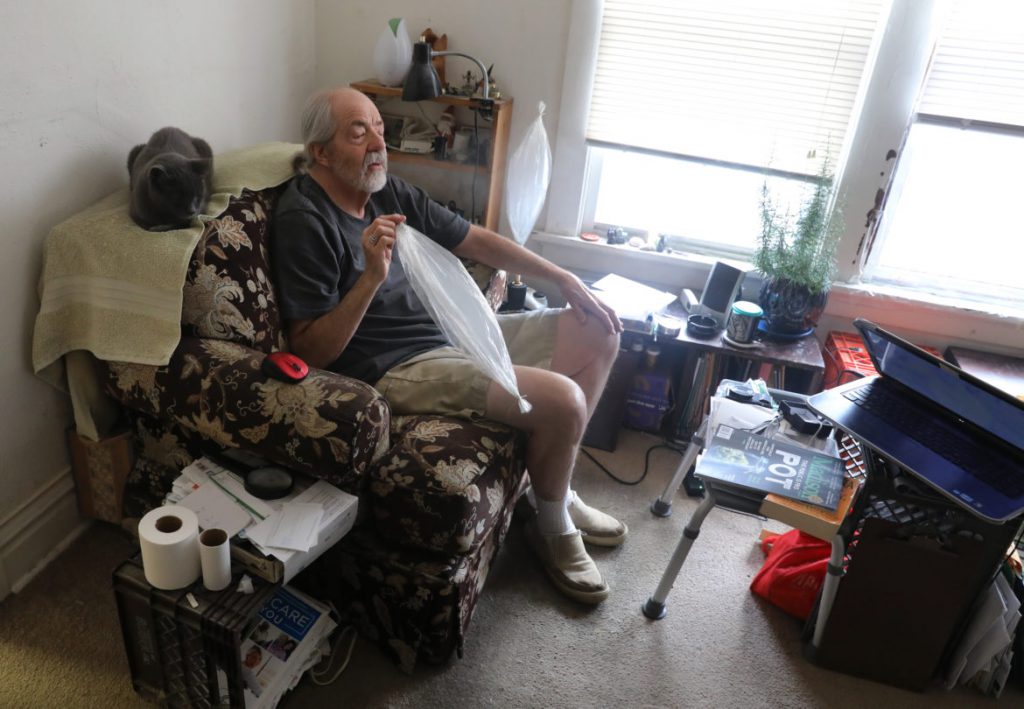
Madison, Wis., resident Gary Storck inhales marijuana from a vaporizer in his apartment on March 20. Storck favors Gov. Tony Evers’ proposals to legalize cannabis for medical use and to decriminalize possession of small amounts of the drug. Says Storck: “These issues have majority popular support.” Photo by Coburn Dukehart/Wisconsin Center for Investigative Journalism.
Gary Storck has been here before.
For decades, Storck, a longtime medical marijuana advocate from Madison, has been pushing the state Legislature to legalize his medicine. Storck suffers from glaucoma. He uses cannabis to slow progression of the disease, which is gradually robbing him of his sight.
The first big moment was in 2002, when statewide polling found that 80.3 percent of Wisconsinites supported medical marijuana. Storck was ecstatic. When he first heard the numbers, “I jumped in the air about a foot, I think. I was so happy to see that level of support.”
Storck was convinced that this would be the moment to finally legalize medical marijuana. Volunteers from Is My Medicine Legal Yet?, a group that Storck co-founded, placed copies of the polling results in every office at the State Capitol.
“We thought, they see this, they’re going to pass it,” Storck said. “Well, it didn’t happen.” A bipartisan bill sponsored by former Republican Rep. Gregg Underheim of Oshkosh did not make it out of committee.

Madison, Wis., resident Gary Storck has suffered from glaucoma since he was a child. When he was a teenager, Storck read that marijuana could relieve the pressure and pain in his eyes, and he has been using it as a medicine ever since. He is seen in his apartment in Madison with his cat, Roy, on March 20. Photo by Coburn Dukehart/Wisconsin Center for Investigative Journalism.
In 2009, Wisconsin Democrats swept into power and took control of the governor’s office, the Assembly and the Senate. Medical marijuana was back on the table, with help from politicians including Sen. Jon Erpenbach, D-West Point. Political support seemed to be on the upswing.
That year, a public hearing was held. “People came from all over the state,” Storck said. “It was an eight-hour, standing-room-only public hearing. A lot of patients, they drove so far, and they were waiting and waiting, and they had to leave.”
Fifty-five people spoke in favor of the bill; another 49 registered in favor. Five people spoke against it.
“It seemed like the stars had aligned for us,” Storck said.
But the bill, unable to garner enough bipartisan support, never got a vote. Powerful interests, including the Wisconsin Medical Society and the Wisconsin Department of Justice, were opposed.
Medical marijuana legal in 33 states
While Wisconsin’s laws on marijuana have stayed largely the same — and federal law continues to ban use and sales — bordering states have begun to move on the issue. Illinois, Michigan and Minnesota have all legalized medical marijuana, with Michigan also legalizing recreational use in 2018.
Overall, the medical use of cannabis is legal in 33 states, along with the District of Columbia and several U.S. territories. Recreational use is legal in 10 of those states plus D.C. A legalization push in New Jersey, which is controlled by Democrats, recently failed after lawmakers could not reach consensus.
If Illinois were to legalize recreational marijuana — which newly elected Democratic Gov. J.B. Pritzker lists as one of his top priorities — Wisconsin residents could drive a short distance for an over-the-counter purchase. With such easy access, Storck said, “I don’t know how long prohibition can last.”
Milwaukee County District Attorney John Chisholm believes legalization is imminent.
“The reason I say it’s coming is that pretty much across the state, law enforcement has de-emphasized marijuana enforcement, particularly for possession,” said Chisholm, a Democrat. He noted that in many areas, police officers prefer to give tickets rather than arrest those caught for possession of small amounts of marijuana.
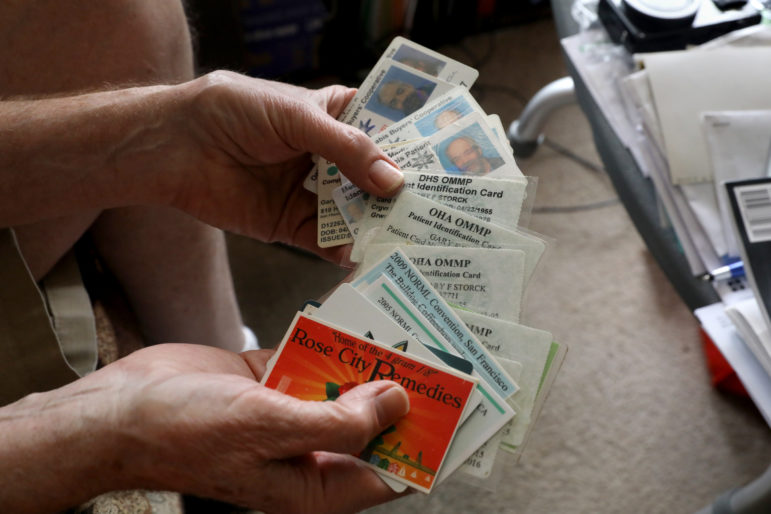
Madison, Wis., resident Gary Storck shows out-of-state medical marijuana cards and marijuana-related memorabilia. Storck uses the cards under an obscure Wisconsin law that allows patients to have a controlled substance with a valid prescription or order from a doctor. Storck uses cannabis to relieve the symptoms of glaucoma. Photo by Coburn Dukehart/Wisconsin Center for Investigative Journalism.
Democratic Gov. Tony Evers has announced proposals to legalize medical marijuana in Wisconsin, decriminalize possession of small amounts of the drug, allow expungement for possession charges and update state laws governing cannabidiol, or CBD, a non-intoxicating over-the-counter treatment for anxiety, seizures and inflammation.
Evers also has said he would consider legalization of recreational use if voters approved it in a statewide referendum.
Support for legalization grows
Evers’ proposals have been lauded by Democratic state legislators — and even some top law enforcement officials — who have seen support for legalization grow in Wisconsin in recent years. In January, a Marquette Law School Poll found that 58 percent of Wisconsinites believe marijuana should be legalized and regulated like alcohol, with 36 percent opposed.
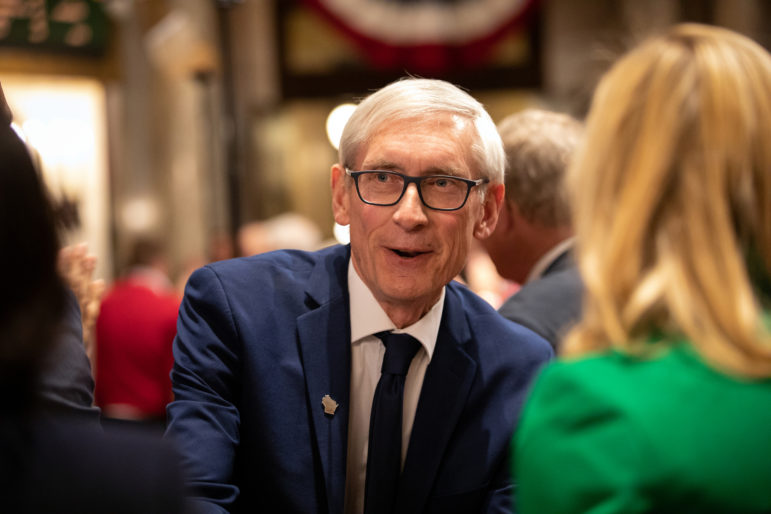
Wisconsin Gov. Tony Evers has proposed decriminalizing possession of small amounts of marijuana, legalizing cannabis for medical uses and expungement for past marijuana possession convictions. Here he greets members of the Assembly and Senate after giving his first State of the State address in Madison, Wis., at the State Capitol on Jan. 22. Photo by Emily Hamer / Wisconsin Center for Investigative Journalism.
In November, local advisory-only referendums in support of marijuana legalization were passed in large numbers across the state, including 16 counties and two cities. Whether the question was about medical or recreational marijuana, no measure passed with less than 60 percent support, and no measure was rejected.
Evers’ plan could help standardize marijuana enforcement in the state. The city of Milwaukee and Dane County have already decriminalized possession of small amounts of marijuana. However, other jurisdictions continue to aggressively enforce anti-possession laws, Dane County Sheriff Dave Mahoney said.
A first offense for possession can be charged as a misdemeanor and carries a maximum penalty of six months in jail and a $1,000 fine. Subsequent offenses can be charged as a felony and carry a maximum penalty of 3.5 years in prison and a $10,000 fine.
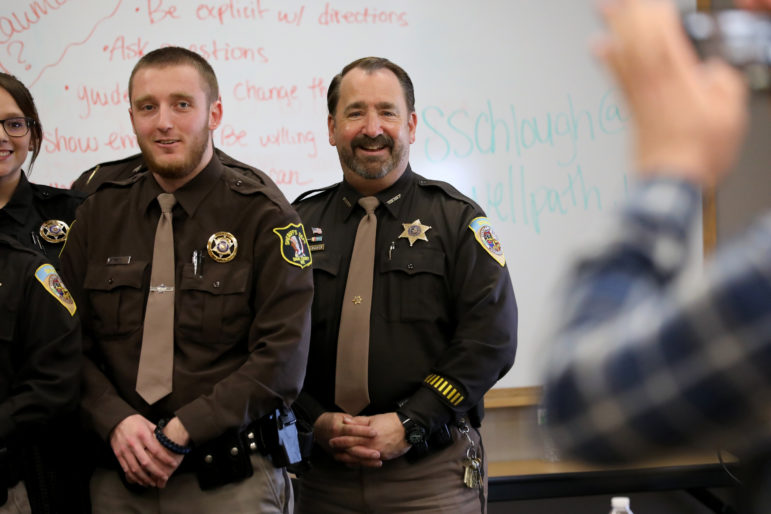
Dane County Sheriff Dave Mahoney greets officers during a Crisis Intervention Training graduation ceremony at the Dane County Law Enforcement Training Center in Waunakee, Wis., on March 15. The Democratic sheriff says he favors decriminalizing possession of small amounts of marijuana, as Dane County already has done, and legalizing cannabis for medical uses. But he opposes full legalization until more studies are done about its effects in other states. Photo by Coburn Dukehart / Wisconsin Center for Investigative Journalism.
While Mahoney, a Democrat, has no problem with residents of Dane County who are “smoking a doobie,” he said statewide law enforcement groups would oppose legalizing marijuana for recreational use. Mahoney said he has moved towards the center of the legalization debate — in part because members of his family use cannabis medicinally — but he does not support recreational marijuana at this time.
“I want to see more research,” Mahoney said.
Evers’ plan has also been endorsed by other Wisconsin top law enforcement officials, including Chisholm, who believes that the proposal could help to reduce disparities in how marijuana possession is treated around the state.
“I think that what the governor’s attempting to do is just saying, ‘Look, major sections of (local) ordinances allow less than 25 grams to be a ticket (rather than a crime),’ ” Chisholm said. “Why not just incorporate that into the state law, and that does away with some of the unequal enforcement rates.”
GOP leaders not on board
Assembly Speaker Robin Vos, R-Rochester, opposes most of Evers’ plan.
The governor’s proposal “makes it easier to get recreational marijuana and provides a pathway to full legalization, which I do not support. I’m open to medical marijuana when it’s prescribed by a doctor but it has to be done in a targeted way without allowing recreational use,” Vos said in a statement.
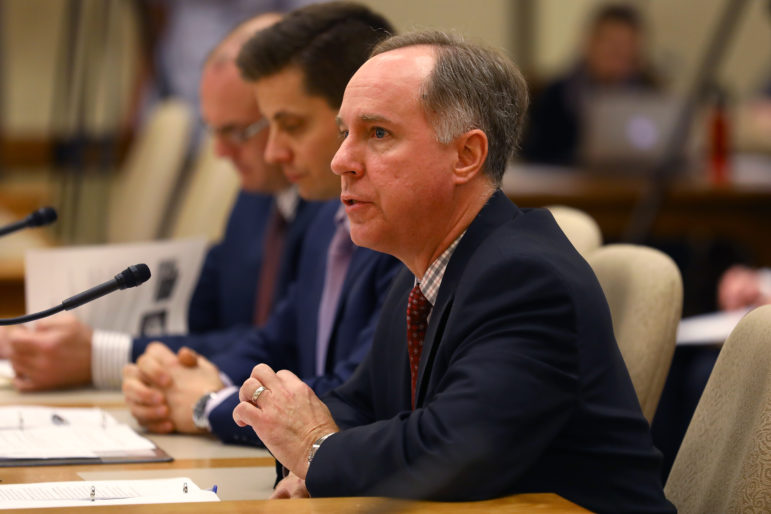
Assembly Speaker Robin Vos, R-Rochester, says he opposes most of Evers’ plan regarding marijuana. He is seen here during a 2018 hearing at the state Capitol. Photo by Coburn Dukehart / Wisconsin Center for Investigative Journalism.
In an email, an aide to Senate Majority Leader Scott Fitzgerald, R-Juneau, reiterated his previous positions in opposition of legalization. Fitzgerald also has been quoted as saying he does not believe that there is enough support within the Republican-controlled Senate for movement on the proposals.
And there are groups, including Smart Approaches to Marijuana, that would likely mobilize if Wisconsin proposes legalizing the drug for recreational use. SAM spokesman Colton Grace said the group pushes for alternatives in states considering legalization, including allowing medicinal uses as approved by the U.S. Food and Drug Administration.
“We don’t support the status quo … we support decriminalization,” Grace said. The group’s message: “Decriminalize, don’t legalize.”
Evers’ cancer leads to cannabis support
An important provision of the proposals is the legalization of medical marijuana, which Evers says was influenced by his experience as a cancer patient. Evers beat esophageal cancer about 10 years ago. Some cancer patients use marijuana to combat nausea from chemotherapy and to curb cancer pain.

Alan Robinson, executive director of the Wisconsin chapter of the National Organization for the Reform of Marijuana Laws (NORML), says his organization is expanding and opening new chapters in the state. Public support for marijuana legalization has grown in recent years, but he says many Republicans who run the Legislature oppose it. He is seen on Jan. 31, at the University of Wisconsin-Madison. Photo by Coburn Dukehart / Wisconsin Center for Investigative Journalism.
Alan Robinson, executive director of the Wisconsin chapter of the National Organization for the Reform of Marijuana Laws (NORML), said he uses cannabis to reduce symptoms of anxiety and depression and post-traumatic stress order, or PTSD, which he developed after the drug overdose death of a close friend.
“It wasn’t until a friend urged me to smoke weed that I began to feel some relief,” said Robinson, who sports dress socks featuring marijuana leaves. “This was the first time that I had slept the whole night through in years, and it was life-changing.”
Greg Kinsley is a medical marijuana advocate with Crohn’s disease, an inflammatory bowel disease that can cause abdominal pain and severe diarrhea. In 2014, Kinsley used a doctor’s note to avoid possession charges under an obscure Wisconsin law that allows patients to have a controlled substance with a valid prescription or order.
Kinsley believes it is time to legalize.
“We are a country of laws,” he said. “If the law’s not quite right, we as a people need to change that.”
Legalization has popular support
Rep. Melissa Sargent, D-Madison, says she has never used marijuana. But Sargent has become the face of marijuana legalization in the past three legislative sessions. She has introduced legalization bills after hearing stories of the medical benefits that constituents have experienced and the negative consequences of marijuana-related arrests and convictions.
“I very quickly realized that the most dangerous thing about marijuana in Wisconsin was that it was illegal,” Sargent said.

State Rep. Melissa Sargent, D-Madison, introduced bills to legalize marijuana in Wisconsin each of the past three legislative sessions. Sargent says she has heard from many constituents of the benefits of using marijuana and the harm of marijuana-related arrests and convictions. She is seen at the University of Wisconsin-Madison on Jan. 31. Photo by Coburn Dukehart / Wisconsin Center for Investigative Journalism.
This year, Sargent is working on a new bill that she said will go beyond Evers’ proposals and call for full legalization for both medical and recreational marijuana. As with Evers’ plan, Sargent’s bill would also allow nonviolent offenders to wipe marijuana-related possession convictions from their records “in ways that they currently cannot.”
When asked what he would say to lawmakers in Wisconsin in a 1-minute pitch for legalization, Robinson responded: “I would definitely try to impress on them that cannabis is likely more popular in their district than they are.”
Sargent agreed: “People across the state of Wisconsin are far ahead of policymakers when it comes to this piece of legislation.”
Chisholm believes Evers’ proposal represents “an opportunity to educate everybody — even the people that are adamantly opposed to it.”
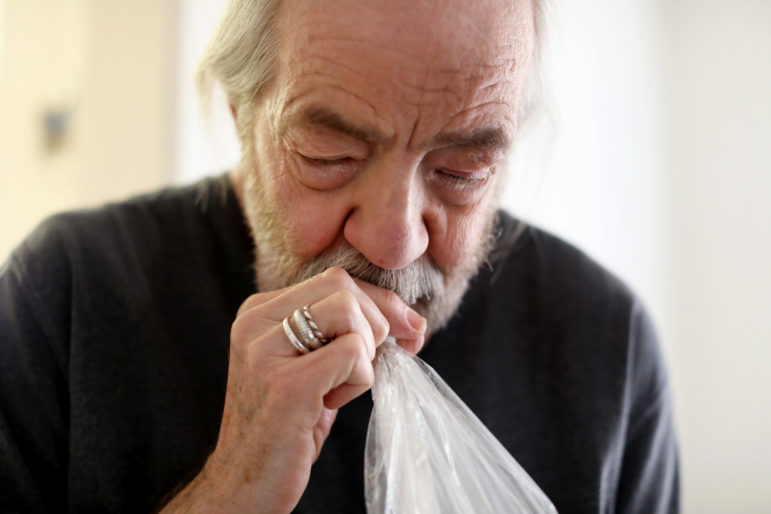
Every two to three hours, Madison, Wis., resident Gary Storck inhales marijuana to relieve the symptoms of glaucoma. Storck is a leading advocate of legalizing marijuana for medical use in Wisconsin. He co-founded the group, Is My Medicine Legal Yet?, and he writes the Cannabadger blog, which tracks proposals to legalize marijuana in Wisconsin. He is seen in his apartment on March 20. Photo by Coburn Dukehart / Wisconsin Center for Investigative Journalism.
People like Storck, who have long been waiting for legalization, hope that 2019 is not a repeat of the past.
“The push for medical may be a step too far for some, as well as the proposed decriminalization, but these issues have majority popular support, and I hope the GOP will listen to the will of the people,” Storck said.
This story was produced as part of an investigative reporting class in the University of Wisconsin-Madison School of Journalism and Mass Communication under the direction of Dee J. Hall, the Wisconsin Center for Investigative Journalism’s managing editor. The Center’s collaborations with journalism students are funded in part by the Ira and Ineva Reilly Baldwin Wisconsin Idea Endowment at UW-Madison. The nonprofit Center (www.WisconsinWatch.org) collaborates with Wisconsin Public Radio, Wisconsin Public Television, other news media and the UW-Madison School of Journalism and Mass Communication. All works created, published, posted or disseminated by the Center do not necessarily reflect the views or opinions of UW-Madison or any of its affiliates.
More about the Legalizing of Marijuana
- Wisconsin Voters Back Legal Weed, Lawmakers Still Say No - Anya van Wagtendonk - Feb 12th, 2026
- Wisconsin Lawmakers and Hemp Producers Both Want New Regulations on THC - Lorin Cox - Oct 7th, 2025
- Hesselbein Will Revive Medical Marijuana Bill - Anya van Wagtendonk - Dec 16th, 2024
- Data Wonk: Will State Move to Legalize Marijuana? - Bruce Thompson - Sep 25th, 2024
- Data Wonk: Should Wisconsin Legalize Marijuana? - Bruce Thompson - Sep 18th, 2024
- Indigenous-Led Campaign Launches to Support Medical Marijuana - Isiah Holmes - Sep 4th, 2024
- How Delta-8 Impacts Marijuana Debate in Wisconsin - Richelle Wilson - Jun 18th, 2024
- Milwaukee Officials Praise Rescheduling of Cannabis by Biden - Isiah Holmes - May 20th, 2024
- What Will Wisconsin Do Now That Feds Are Moving to Ease Marijuana Restrictions? - Rich Kremer - May 2nd, 2024
- A Better Wisconsin Together Renews Call for Cannabis Legalization - A Better Wisconsin Together - Apr 20th, 2024
Read more about Legalizing of Marijuana here
-
Legislators Agree on Postpartum Medicaid Expansion
 Jan 22nd, 2025 by Hallie Claflin
Jan 22nd, 2025 by Hallie Claflin
-
Inferior Care Feared As Counties Privatize Nursing Homes
 Dec 15th, 2024 by Addie Costello
Dec 15th, 2024 by Addie Costello
-
Wisconsin Lacks Clear System for Tracking Police Caught Lying
 May 9th, 2024 by Jacob Resneck
May 9th, 2024 by Jacob Resneck





















